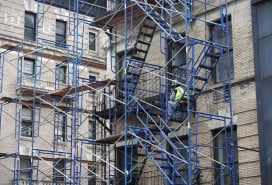Rent Coach: We broke our lease, found new tenants and the landlord blew them off. Why are we still on the hook?

Q. My wife and I recently broke our lease after a job change that required a move. Our landlord informed us that there would be an $800 fee involved and that we would be responsible for the rent until a new tenant started paying it. We actually had an acquaintance willing to take over the lease.
After having paid the $800 fee, the landlord failed to acknowledge our proposed tenant's calls requesting a showing of the apartment and instead listed the apartment for $650 per month more than our current rent. They also advertised it as a two bedroom (we had installed a wall at our own expense) and advertised that the apartment would undergo a significant renovation before the next tenant moves in.
Why should we be responsible for the rent if the landlord rejected an offer to take over the lease on the same terms we currently have? Also, shouldn’t they have to compensate us for raising the rent since we put the wall in?
A. There are quite a few individual issues that need to be addressed here. Let’s start with the easiest one--the wall. When a tenant makes an improvement to a property, pursuant to a typical residential lease, that improvement must stay with the property and the landlord has no obligation to compensate the tenant for it. Further, if the tenant made the improvement without the explicit authorization of the landlord, the tenant can actually even be charged to return the premises to its original condition.
With regard to the $800 fee, it would be important to know what this fee was buying you. Was an agreement signed stating the terms of the arrangement? It clearly didn’t provide you with the right to simply terminate the lease, because you are still obligated to pay rent. But did it obligate the landlord to advertise the apartment to find a new tenant? Was it intended to cover administrative expenses related to signing a new lease? If it was the latter, you should not have agreed to pay that before a new lease was actually signed.
The landlord’s renovations are the most difficult to address. As a starting point, the landlord has the right to charge whatever rent he wishes of the tenant if that tenant signs a new lease and you are released from your obligations either because an early termination agreement is entered into or because the new lease began after the natural end of your lease. However, so long as you are paying rent you have legal possession of the apartment and the landlord had no right to enter the apartment and begin the work without your permission. This may be the best angle to approach the landlord with now. You may be able to use their actions as leverage to reopen negotiations. Perhaps you can suggest that you will agree to allow them unfettered access to the apartment if you reach an early termination agreement that releases you of your obligations as of a certain date.
Lastly, we need to address the proposed tenant whom wanted to take over your lease. In New York, a tenant (such as you) has the right to sublet an apartment in so far as that the landlord cannot “unreasonably” refuse a request to sublet. However, strict rules must be followed. The tenant must meet the landlord’s qualifications to rent the apartment and sign a lease.
It sounds as though your prospective tenant only called to view the apartment and it was not the landlord’s obligation to arrange that. If you wished to sublet, it is your obligation to find the tenant, submit the application, to the landlord, and facilitate the signing of a sublet agreement. Further, it’s important to remember that when you sublet, you are not “breaking the lease” but rather remain obligated if the sub-tenant were to default on their sublease. At the end of your lease terms, the sublease ends, and if the parties agree, the subtenant can enter into a normal lease with the landlord moving forward.
At this point you have little leverage because you’re paying rent and have vacated the apartment. Your best option is to contact the landlord or management company insisting that they immediately cease their renovation project and return the apartment to a livable condition. Of course they will not wish to do so which may create the leverage you need to open up a discussion about a lease termination. You may wish to engage an attorney to have this conversation on your behalf. Alternatively, or in conjunction with the previous strategy, you could engage a broker to list the apartment for rent to find a prospective tenant for you to present to the landlord. The broker could be paid by you or the new tenant.
Mike Akerly is a New York City real estate attorney, landlord, and real estate broker. He is also the publisher of the Greenwich Village blog VillageConfidential.
Note: The information provided here is for informational purposes only. It should not be construed as legal advice and cannot substitute for the advice of a licensed professional applying their specialized knowledge to the particular circumstances of your case.
Related:
Rent Coach: Is my broker entitled to a fee even though he didn't show me the apartment I'm taking?
Rent Coach: Why won't my broker lower her fee on a condo rental?
Rent Coach: Broker says there is a fee. Sign says there isn't. What gives?
Rent Coach: When does a broker's fee agreement expire?
Moving to NYC? Here’s a crash course in finding an apartment here
























